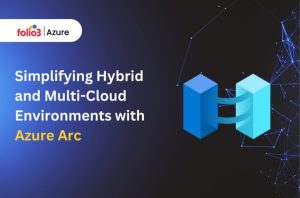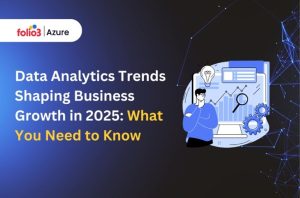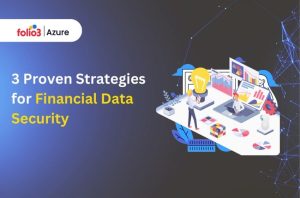Table of Contents
ToggleThe artificial intelligence revolution has moved beyond experimental phases into boardroom priorities. Companies that once viewed AI as a futuristic concept now recognize it as an immediate necessity for staying competitive. The challenge isn’t whether to adopt AI anymore; it’s how to implement it effectively while ensuring security, compliance, and genuine business value.
Microsoft Azure AI addresses this challenge head-on through intelligent cloud capabilities that transform how organizations operate. The platform doesn’t just offer AI tools, it provides a complete ecosystem where businesses can harness artificial intelligence’s full potential without compromising on enterprise-grade requirements.
The transformation is already underway. Microsoft’s AI business has crossed $13 billion in annual revenue, surging 175% year-over-year, while Azure maintains impressive 31-32% growth rates. But beyond the numbers, the real story is impact: enterprises aren’t just experimenting with AI anymore; they’re achieving a collective 284% ROI over three years through strategic Azure AI implementations.
In this article, we’ll explore how Microsoft Azure AI and the intelligent cloud are revolutionizing enterprise innovation with Copilot, Microsoft Fabric, and AI Agents, enabling organizations to push boundaries and unlock new possibilities in the business landscape.
Azure AI Strategy Overview
Microsoft Azure AI strategy is built on three key pillars: Intelligent AI Copilots, a robust AI infrastructure through Azure, and advanced AI models, including both Microsoft’s and partners’ solutions, all underpinned by a strong commitment to responsible AI principles like fairness, security, transparency, and accountability.
The Three Strategic Pillars
Microsoft’s approach focuses on making AI accessible and useful for businesses, with its strategy centered on these core elements:
- AI Copilots: These are intelligent assistants designed to work alongside users, enhancing their productivity and creativity by integrating AI into everyday work and applications.
- AI Infrastructure: A secure, scalable, and reliable foundation, primarily built on Microsoft’s Azure platform, is essential for developing, training, and deploying AI solutions effectively.
- Advanced AI Models: The strategy involves both developing proprietary models and partnering with others, such as through the Azure OpenAI Service, to offer a wide range of advanced AI capabilities.
Six Technologies Driving Enterprise AI Transformation
Copilot and Copilot Studio: AI Development for Everyone
Microsoft Copilot fundamentally changes how knowledge workers interact with technology. Integrated directly into Microsoft 365 applications, it handles routine tasks, generates creative content, and provides contextual insights that amplify human decision-making capabilities.
Copilot Studio takes this further by democratizing AI assistant development. Business users can now create specialized AI tools for specific domains without extensive coding knowledge. This shift puts Azure AI tools directly into the hands of those who understand business challenges best.
Organizations report 30-60% reductions in routine task completion times, enhanced creative output, and seamless integration of business intelligence into daily workflows. The barrier between business need and AI solutions continues to shrink.
Microsoft Fabric: Unified Data Intelligence
Traditional data analytics often fragments across multiple tools and platforms. Microsoft Fabric eliminates this friction through a unified platform that brings together data engineering, data science, and business intelligence with native AI integration throughout.
The platform’s azure ai capabilities include seamless Azure OpenAI Service integration, automated data preparation that reduces manual effort by 70%, and natural language querying that lets business users interact with complex datasets conversationally.
Azure OpenAI Service: Enterprise-Grade Generative AI
Access to advanced language models like GPT-5 and DALL-E becomes enterprise-ready through Azure OpenAI Service. Organizations implement powerful generative AI capabilities while maintaining the security, privacy, and compliance standards that enterprise operations demand.
The service transforms content creation, code generation, customer service automation, and knowledge management. Critical to enterprise adoption, the Azure AI security framework ensures sensitive data protection while enabling cutting-edge AI capabilities.
AI Agents: Autonomous Business Intelligence
AI agents represent the next evolution, autonomous systems that perform complex tasks with minimal human oversight. Microsoft’s approach includes Azure AI Studio for creating reasoning agents, Semantic Kernel for seamless enterprise integration, and tools for building self-improving systems.
These technologies prove transformative for process automation, intelligent customer engagement, and real-time decision support systems. The shift from human-supervised AI to autonomous AI agents marks a fundamental change in how enterprises approach operational efficiency.
Azure Cognitive Services and Machine Learning: Innovation Foundation
Ready-to-use APIs for computer vision, speech recognition, and natural language processing through Azure Cognitive Services enable rapid AI implementation. Azure Machine Learning provides comprehensive custom model development tools for addressing specific business challenges.
This foundation approach delivers 50-70% faster AI implementation timelines compared to building solutions from scratch. Organizations focus innovation efforts on unique business applications while leveraging proven, scalable AI infrastructure.
AI Foundry: Complete Enterprise AI Platform
Azure AI Foundry provides end-to-end infrastructure for enterprise-grade generative AI deployment. The platform addresses model customization and fine-tuning, robust scaling infrastructure, governance frameworks for responsible AI implementation, and seamless integration with existing business systems.
This comprehensive approach ensures organizations transition smoothly from experimental AI initiatives to production-ready solutions that deliver measurable business impact.
Advanced Implementations: Beyond Basic AI
Microsoft Azure AI’s sophisticated Azure AI platform extends far beyond traditional applications through revolutionary search and retrieval technologies. These advanced Azure AI capabilities represent the next generation of intelligent cloud capabilities, designed specifically for complex enterprise scenarios that demand both precision and scale.
Semantic Understanding
Azure AI Search’s vector search functionality transforms information discovery by understanding semantic meaning rather than relying solely on keyword matching. This breakthrough in Azure AI solutions enables enterprises to build intelligent applications that comprehend context, intent, and relationships within massive data repositories.
Organizations typically see 40-60% more relevant search results compared to traditional keyword-based approaches, fundamentally changing how employees access critical business information.
The technology leverages dense vector representations of content, allowing the system to understand conceptual similarities even when exact terms don’t match. This means a search for “quarterly revenue challenges” can surface documents discussing “fiscal performance obstacles” or “Q3 financial difficulties.”
Hybrid Integration
The platform’s hybrid search capabilities merge the precision of vector-based semantic search with the reliability and familiarity of full-text search. This dual approach creates comprehensive Azure AI solutions that automatically adapt to diverse query types—from highly technical documentation searches to general customer support inquiries.
Key benefits include:
- Automatic query optimization based on content type and user intent
- Fallback mechanisms ensuring reliable results across all scenarios
- Seamless integration with existing search workflows
- Enhanced relevance scoring that considers both semantic and lexical matches
This hybrid methodology ensures optimal performance while maintaining the Azure AI security standards required for enterprise deployment across regulated industries.
Multimodal and Agentic Capabilities
Advanced multimodal search enables organizations to query across text, images, videos, and other media types simultaneously. Users can upload an image of a product defect and find related documentation, similar cases, and troubleshooting procedures in a single search operation.
The platform’s agentic retrieval systems represent a significant leap forward:
- Autonomous refinement of search strategies based on user context and behavior
- Dynamic query expansion using organizational knowledge graphs
- Personalized result ranking based on role, department, and historical interactions
- Continuous learning from user feedback and engagement patterns
Retrieval Augmented Generation (RAG)
These Azure AI tools leverage RAG to provide contextually enriched responses that combine real-time data retrieval with generative AI capabilities. Rather than providing static search results, the system generates comprehensive, contextual answers that synthesize information from multiple sources while citing specific references for verification.
This positions Azure as the definitive Azure AI platform for enterprise-scale intelligent search implementations that go far beyond simple document retrieval.
Enterprise Security and Reliability: Built for Mission-Critical Operations
When enterprises deploy AI solutions, security and reliability aren’t optional features, they’re fundamental requirements. Microsoft Azure AI addresses these critical concerns through comprehensive frameworks designed specifically for mission-critical business operations.
Multi-Region Reliability and Business Continuity
Azure AI Search implements sophisticated multi-region reliability configurations that ensure continuous availability even during unexpected disruptions. The platform’s distributed architecture automatically replicates data and services across multiple geographic regions, providing enterprise-grade redundancy that meets the most stringent business continuity requirements.
Key reliability features include:
- Automatic failover mechanisms that maintain service availability during regional outages
- Load balancing across multiple data centers to optimize performance and reduce latency
- Real-time health monitoring with proactive alerting for potential issues
- Service level agreements (SLAs) that guarantee 99.9% uptime for production workloads
Organizations can configure deployment strategies that align with their specific geographic, regulatory, and performance requirements, ensuring optimal service delivery regardless of user location.
Comprehensive Security Framework
The Azure AI security infrastructure encompasses multiple layers of protection designed to safeguard sensitive enterprise data throughout the AI lifecycle. This includes advanced encryption protocols, network isolation capabilities, and granular access controls that meet compliance requirements across regulated industries.
Security implementations cover:
- Data encryption both in transit and at rest using industry-standard protocols
- Network-level isolation through virtual private networks and firewall configurations
- Identity and access management integration with existing enterprise directory services
- Comprehensive audit logging for compliance reporting and security monitoring
- Regular security assessments and penetration testing by independent third parties
Compliance and Governance
The platform maintains certifications for major compliance frameworks, including SOC 2, ISO 27001, GDPR, HIPAA, and industry-specific regulations. This comprehensive approach ensures that Azure AI for enterprises can be deployed confidently in highly regulated environments without compromising on capability or innovation potential.
Built-in governance tools provide administrators with granular control over AI model usage, data access patterns, and system behaviors, enabling organizations to maintain regulatory compliance while maximizing AI benefits across their operations.
Industry Transformation in Action
- Healthcare organizations leverage Azure AI solutions for precision medicine through genomic analysis, drug discovery acceleration that reduces development timelines by 2-3 years, and predictive health analytics that cut hospital readmissions by 25-30%.
- Financial institutions implement intelligent risk assessment systems that reduce fraud detection false positives by 60% while maintaining 95% accuracy rates. Personalized financial advisory capabilities increase customer satisfaction by 40% while reducing operational costs.
- Manufacturing industry adopted Azure AI and IoT to power predictive maintenance across its production systems. By analyzing real-time sensor data and applying Azure-based machine learning models, the company achieved an estimated $5,000 in savings per maintenance intervention, demonstrating the tangible ROI Azure AI can deliver in manufacturing environments.
Strategic Implementation Framework for Enterprise Success
Successful Azure AI adoption follows Microsoft’s structured Cloud Adoption Framework, designed specifically for enterprise-scale deployments. This methodology ensures organizations maximize AI investments while maintaining operational excellence through six distinct phases.
- AI Strategy and Planning: Organizations begin by identifying AI use cases, defining technology strategies, and developing responsible AI frameworks using Copilots and Azure services. This foundation phase establishes clear roadmaps with actionable milestones and resource requirements.
- AI Ready: The preparation phase focuses on Azure implementations, establishing technical foundations through Azure AI platform capabilities. Key activities include establishing AI governance, connectivity, reliability, and choosing optimal architectures that support scalability and integration requirements.
- Govern and Manage AI: As capabilities expand, organizations implement comprehensive oversight using both Copilots and Azure infrastructure. This encompasses assessing organizational risks, enforcing AI policies, managing operations, deployments, models, costs, and ensuring business continuity across multiple environments.
- Secure AI: Security spans all phases, protecting AI assets through Azure AI security capabilities. Organizations discover security risks, protect resources and data through encryption and access controls, and detect threats using advanced monitoring systems.
This structured approach ensures that AI integration in Azure delivers maximum value while maintaining enterprise-grade security, compliance, and operational standards required for mission-critical business environments.
Conclusion
Microsoft Azure AI represents a comprehensive ecosystem that transforms enterprise operations through intelligent cloud capabilities. The platform delivers measurable business value while maintaining enterprise-grade security and compliance standards that modern organizations demand.
For enterprises ready to embark on their AI transformation journey, partnering with experienced Azure AI specialists like Azure Folio3 ensures successful implementation. Our expertise in Azure AI development, AI integration in Azure, and enterprise-scale deployments enables organizations to realize the full potential of the Microsoft Azure AI platform.
Ready to transform your enterprise with Microsoft Azure AI? Contact Azure Folio3 today to accelerate your digital transformation journey.




